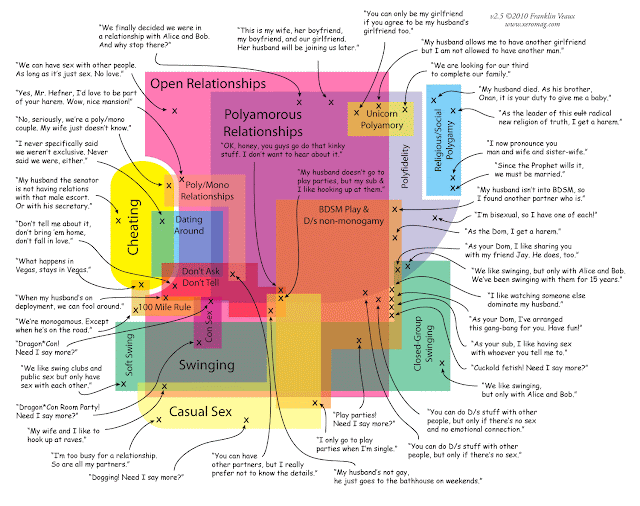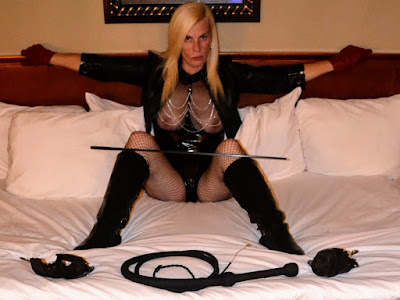Poly-Ships Are Often About More Than Sex - by Starla Knight
Over the past few years, polyamory has become a more widely known term and profiles are more apt to have polyandrous listed than ever before. And perhaps inevitably, certain misconceptions and misunderstandings about what “polyamory” means have become widespread as well. It would be unfortunately difficult to say which among these misunderstandings is the most common, or the most hurtful to polyandrous folks.
There has been much talk about “open marriage” and “open relationships” in recent years, with some even paradoxically dubbing non-monogamy “the new monogamy.” In this open-marriage conception of non-monogamous relationships, there is still a central, committed (often legally married) couple, who allow one another to engage in purely sexual (or at least quite casual) outside relationships. Generally, any discussion about the benefits of such practice revolves around how it strengthens and/or reinvigorates the central couple in question. I want to be perfectly clear that I don’t see anything wrong with strictly sexual non-monogamy so long as it’s genuinely fulfilling and consensual for all involved, including the outside partners. But for those living in polyamorous families, it can be incredibly frustrating when people use those concepts of open marriage to make assumptions about the structure of such relationships.
Because we live in a mono-normative culture that tells us relationships are only valid when they’re exclusive, it makes sense that many people can only conceive of non-monogamy in what ultimately still amounts to monogamous terms. There is a common misconception that a polyamorous relationship is really no different from an open-relationship agreement: one committed couple, with some lighthearted fun on the side. But the word “polyamory,” by definition, means loving more than one. Many have deeply committed relationships with more than one partner, with no hierarchy among them and no core “couple” at the heart of it all. To me, this notion that there must be one more important relationship, one true love, feels a lot like people looking at same-sex couples and thinking that one person must be the “man” in the relationship and the other must be the “woman.” After all, both of these misunderstandings result from people trying to graft their normative conceptions of love and relationships onto people who are partnering in non-normative ways.
It seems that it is somewhat easy for many people to acknowledge that humans are capable of loving one person and still enjoying sex with others (assuming, of course, that the terms of their relationship make such behavior acceptable). But it is much harder for people to think outside the fairy-tale notion of “the one” and imagine that it might be possible to actually romantically love more than one person simultaneously.
The unfortunate result of this is that, for those of us in more than one serious and meaningful relationship, the world around us insists on viewing one of those relationships as less valid than the other, especially when one relationship happens to predate others. I have been with my boyfriend for 10 years, cohabitating for the last 9. We are married in every sense but the legal document that dictates ownership. We have shared bank accounts, are both listed on household bills, and manage a home as a “traditional” married couple. But we are also deeply in love with and committed to our girl friend of two and a half years, and it hurts that people make assumptions about that relationship simply being something frivolous and recreational.
Another side effect of this misunderstanding is that people often wonder why we poly people need to talk openly about “what happens behind closed doors.” I have heard many times that there should be no reason to disclose one’s polyandrous relationships with parents, children, or the neighbors. That might seem logical if what we’re talking about is strictly extramarital sexual partners. But my life with my partners isn’t reducible to “what happens behind closed doors” any more than any serious, long-term relationship is. We now all share a home and a life; we are a family. Openly, publicly acknowledging our girlfriend as a partner is not just saying that we all have sex. It’s saying that, both are my partner in every sense of the word. They love me and support me, respect me. I give the same to both of them in return. They see me at my worst and still want to spend this life with me anyway. It would be unimaginable to me to hide the nature of our relationship, to pretend that she is merely a friend or roommate, to not have her by our side at weddings and funerals and family holiday gatherings. But this is exactly what people are expecting of me when they ask why I feel the need to be so “open” about my “private business.”
Having more than one serious relationship at a time isn’t new. One form of polyandry or another has been going on since the invention of relationships, period. There are several different configurations of polyamory. Some will be in a committed relationship with everyone involved. For some “polyamory” means “committed couples who have casual partners on the side.” Some cultures have accepted some forms of polyandry, while others, not so much. Yet at the moment, more and more people in our monogamous-centered society are speaking up about being polyandrous.
This speaking out has unsettled many who fear a disrupt to the mono-normative culture, just as people irrationally feared what gay marriage would do to the sanctity of marriage. Yet when we consider the divorce rate, and the number of separations that happen due to infidelity, perhaps being open about being poly is a good thing. If more and more people feel as though they can admit that monogamy isn’t their fairy tale dream, then more honest relationships would ensue, thus bringing the divorce rate down.
At the end of the day, if you have polyamorous friends, relatives, or acquaintances, please don’t make assumptions about their lives based on what you think all non-monogamous configurations look like. Let them tell you how they define their relationships. And if they identify multiple people as their partners, don’t try to read into who is more important than whom, imagining hierarchies even if you’re told there are none. Though it might not fit with how you conceptualize love, offer polyamorous relationships the same validation that you would offer any other. And remember what a common human thing it is to want to be able to tell the world — and not be told by the world — whom we love.
As always, I would love to hear from you. How do you feel about poly relationships, good or bad? Email me starla.friction@gmail.com






Comments
Post a Comment